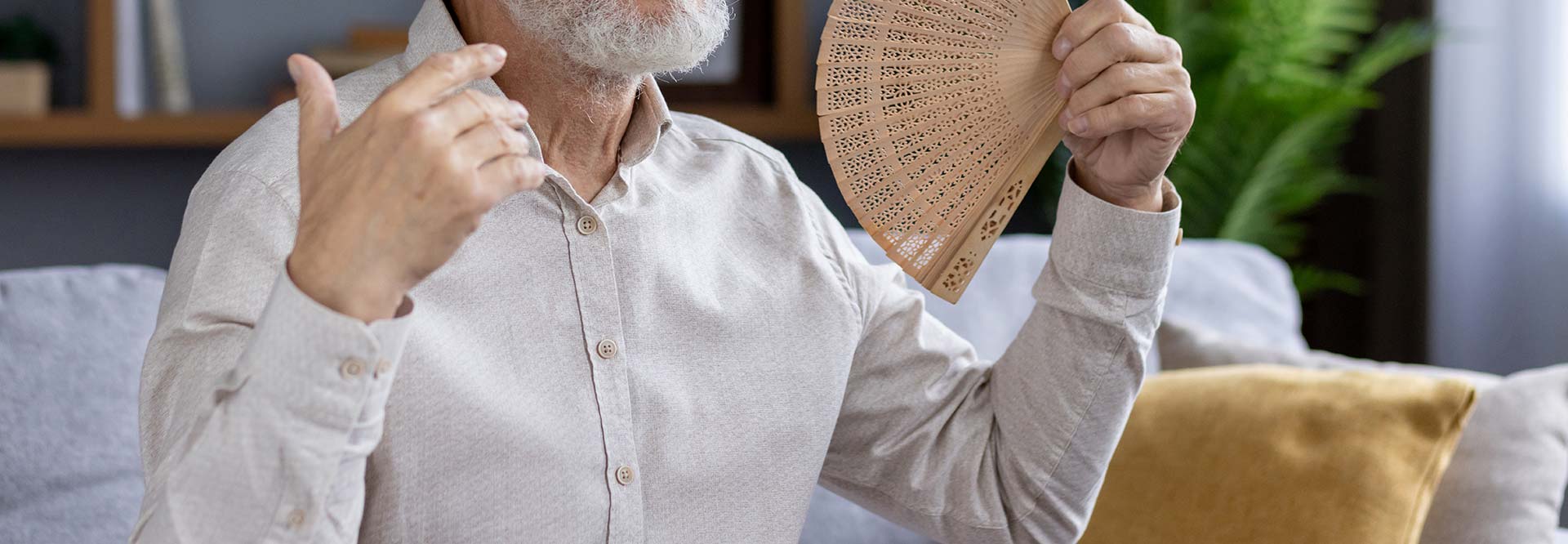
When an elderly person gets overheated they may feel excessively hot due to medications, thyroid issues, dehydration, decreased blood circulation, or hormonal changes. Proper medical assessment is essential, especially if these symptoms are new or worsening, to determine appropriate management and care.
An elderly person feeling hot or experiencing sudden changes in body temperature can be caused by these factors:
Understanding the specific cause of an elderly person feeling hot all the time requires medical evaluation, especially if this symptom is new or has suddenly become more pronounced.
Overheating in the elderly can manifest in serious symptoms, each indicating different levels of heat-related stress. Here’s a breakdown of these symptoms:
These conditions show the importance of monitoring the elderly during hot weather and ensuring they stay hydrated, cool, and well-ventilated to prevent overheating.
Underlying medical conditions can significantly contribute to increased heat sensitivity in the elderly. Conditions like diabetes, heart disease, and poor circulation can cause impaired thermoregulation and limit the body’s natural ability to regulate temperature. Diabetes can affect peripheral blood flow and sweat production, while heart disease can limit the heart’s ability to pump blood effectively during heat stress.
Many elderly people take medications that can impact their body’s heat response. Diuretics can lead to dehydration reducing the body’s ability to sweat and cool down. Other medications may interfere with heat regulation by affecting the central nervous system or altering blood flow.
With age, the skin’s ability to produce sweat diminishes, and many chronic illnesses further reduce this capacity. Reduced sweating decreases the body’s primary method of heat dissipation, increasing vulnerability to heat.
Chronic diseases often cause systemic inflammation and metabolic changes, which can alter internal temperature regulation. Conditions like thyroid disorders significantly affect metabolic rate, influencing body temperature. Neurological conditions and diseases like Parkinson’s or stroke can affect the part of the brain that regulates body temperature, making some elderly people more susceptible to external temperature changes.
To ensure the safety and comfort of elderly people during hot weather, precautions are recommended. Encourage them to stay hydrated by drinking plenty of fluids, avoiding alcohol and caffeine. Keeping indoor environments cool with air conditioning or fans, and using curtains to block out heat during peak sun hours, are also advised. Dressing in lightweight, loose, and light-colored clothing can help manage body temperatures. Limit exposure to the sun, especially between 10 a.m. and 4 p,m., and consider scheduling outdoor activities for cooler parts of the day. Cool showers or baths can provide immediate relief from heat, and eating smaller, cooler meals can prevent overheating. It’s important to understand how medications might affect heat tolerance and to ensure regular check-ins by friends, family, or caregivers to monitor for signs of heat-related illnesses like heat exhaustion, which include symptoms like headache, nausea, and dizziness. Seek quick medical attention if these symptoms appear. These steps help protect elderly individuals from heat-related health issues and enhance their well-being during warm seasons.
Preventing overheating in the elderly is important especially during hot weather, because they are more susceptible to heat-related illnesses. Here are some effective strategies:
By implementing these measures, caregivers and elderly individuals can significantly reduce the risk of overheating, ensuring their health and safety during the warmer months.
If an elderly person shows signs of heatstroke or severe heat exhaustion, immediate action should be taken to prevent life-threatening complications.
First, call emergency services right away; heatstroke is a medical emergency. While waiting for help, move the person to a cooler environment, like an air-conditioned room or a shaded area. Remove any excess clothing to help reduce their body temperature. If they are conscious and able to swallow, provide them with water or a sports drink to help rehydrate, but do not give them anything to drink if they are confused or unconscious.
Apply cool, wet cloths or ice packs to their head, neck, armpits, and other areas to enhance cooling. Don’t use cold water or ice baths, which can cause blood vessels to constrict and worsen the condition. Monitoring their condition closely until medical help arrives is essential. Rapid response can be crucial for their survival and recovery from severe heat-related illnesses.
Discover the key differences between retirement homes and assisted living to help you choose the right care for your loved one’s needs.
Discover the key differences between retirement homes and assisted living to help you choose the right care for your loved one’s needs.
Discover the key differences between retirement homes and assisted living to help you choose the right care for your loved one’s needs.
Learn the risks of leaving a dementia patient alone, legal responsibilities, care strategies, and how to plan for their safety.